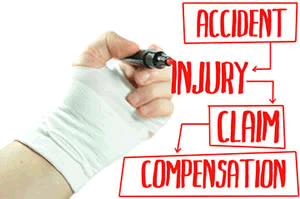Workers compensation when can it be garnished?
Recently on our legal forum a user asked, “I was injured on the job a few months ago. I am receiving workers’ compensation. Unfortunately, I also have high credit card debts and unpaid medical bills. I am wondering if my workers’ compensation settlement will be safe from creditor garnishment?”
What is workers’ compensation?
Workers’ compensation is paid to injured workers who have been injured while performing their normal job duties. Workers may receive payments for their injuries without proving that their employer was negligent for their injuries.
In return, employees generally forfeit their rights to file personally injury claims against their employers to receive more compensation then is allocated under state work comp laws.
Employees who receive workers’ compensation settlements may or may not be able to return to full-time employment. In many cases work injuries may be so severe that employees have to completely quit work or take a part-time job which may not offer as much long-term financial incentives.
With this in mind, it is very important that you are able to protect your work comp payments and settlements received from wage garnishments.
What are wage garnishments?
According to the United States Department of Labor, a wage garnishment is “any legal or equitable procedure through which some portion of a person's earnings is required to be withheld by an employer for the payment of a debt.”
Now, you asked whether your workers’ compensation can be garnished by your creditors to repay debt obligations. Unfortunately, the answer to this question is not simply yes or no. In fact, both state and federal laws govern the type of income, the amount of income, and the type of creditor who is allowed to garnish wages.
Who can garnish your workers’ compensation payment?
Generally, workers’ compensation payments cannot be garnished. In fact, like other types of income such as Supplemental Security Income, workers’ compensation is considered a public benefit. Workers’ compensation is even protected under federal laws from levies for taxes owed.
With that said, there might be an exception in some states for debts owed for child support and alimony. In fact, some states may allow a garnishment without a court order.
How much and what types of wages can be garnished?
Although you did not ask this specific question, it’s important to understand the power of the wage garnishment and when a wage garnishment can be legally used to force debt repayment.
In most states, most creditors can obtain a judgment and garnish wages which are not protected under state and federal law. State laws, however, can vary. For example, in the State of Texas, state laws prohibit wage garnishment from creditors, with the exception of creditors who are collecting child support, unpaid tax obligations, and student loans. Bank accounts, rents and royalties, however, can be garnished.
If state and federal law does not prohibit the garnishment of wages from creditors, federal laws limit the amount which can be garnished to “25% of your disposable earnings or the amount by which your weekly disposable income exceeds 30 times the federal minimum wage, whichever is lower.” State laws, however, can be much stricter.
Protecting your workers’ compensation settlement
Although your work comp settlement is generally protected from garnishment, there are steps you may need to take to protect your money. For example, most legal experts will tell you that it’s important to keep the work comp settlement monies separate from any other wages, income, or investments. Keeping the money separate and avoiding commingling of funds ensures that the money is protected and exempt from garnishment.
Make sure that you have information about the account, copies of the settlement check, and any other statements which can verify the origin of the settlement funds. Many lawyers will also tell you may need to go one step further and deposit the funds onto a prepaid debit card, rather than depositing it into a traditional bank account.
Bottom line:
While your workers’ compensation should be protected from any type of garnishment, it is important to discuss your situation with a work comp lawyer to ensure you take the right steps to protect your money.
Related Pages
Latest Question
Prenuptial agreement when can it be disregarded?
Prenuptial agreements are generally enforced but they can be disregarded if certain conditions are met.Category: Divorce


